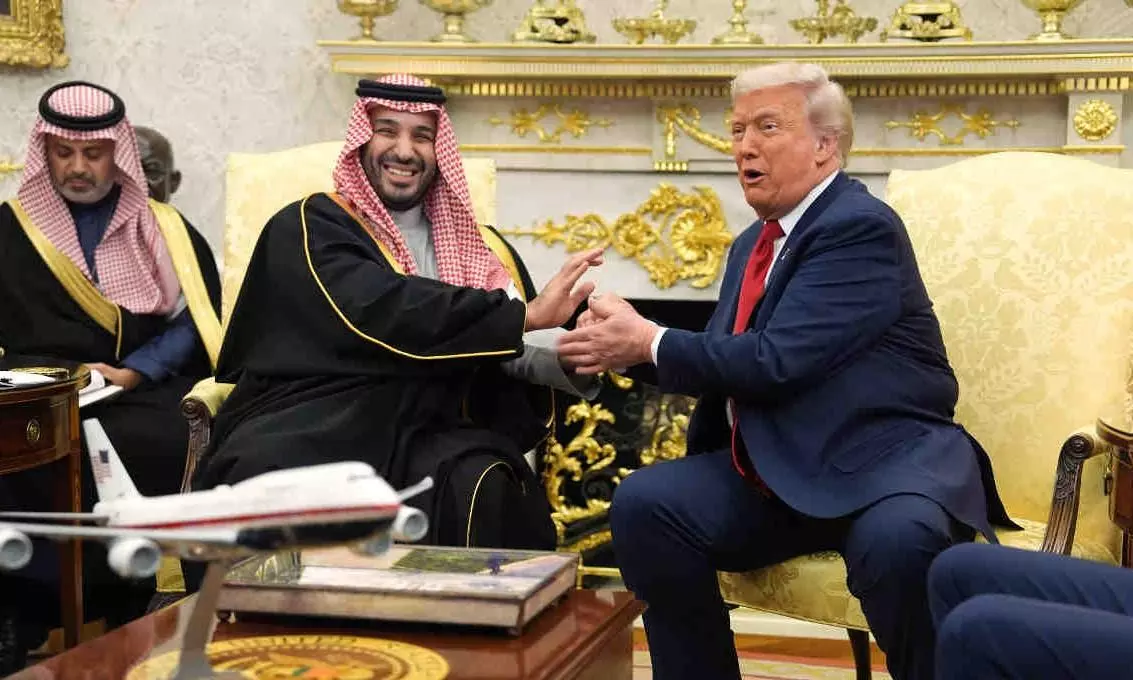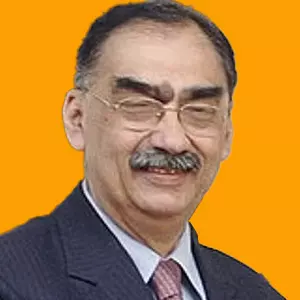
- Home
- India
- World
- Premium
- THE FEDERAL SPECIAL
- Analysis
- States
- Perspective
- Videos
- Sports
- Education
- Entertainment
- Elections
- Features
- Health
- Business
- Series
- In memoriam: Sheikh Mujibur Rahman
- Bishnoi's Men
- NEET TANGLE
- Economy Series
- Earth Day
- Kashmir’s Frozen Turbulence
- India@75
- The legend of Ramjanmabhoomi
- Liberalisation@30
- How to tame a dragon
- Celebrating biodiversity
- Farm Matters
- 50 days of solitude
- Bringing Migrants Home
- Budget 2020
- Jharkhand Votes
- The Federal Investigates
- The Federal Impact
- Vanishing Sand
- Gandhi @ 150
- Andhra Today
- Field report
- Operation Gulmarg
- Pandemic @1 Mn in India
- The Federal Year-End
- The Zero Year
- Science
- Brand studio
- Newsletter
- Elections 2024
- Events
- Home
- IndiaIndia
- World
- Analysis
- StatesStates
- PerspectivePerspective
- VideosVideos
- Sports
- Education
- Entertainment
- ElectionsElections
- Features
- Health
- BusinessBusiness
- Premium
- Loading...
Premium - Events

.......US President Donald Trump met Saudi Arabia's Crown Prince Mohammed bin Salman at the White House on Tuesday (Nov 18). Photo: PTI .........
Mohammed bin Salman’s visit to US marks diplomatic rehabilitation of Saudi Arabia despite the Khashoggi murder; Trump seeks support for Gaza plan, Abraham Accords, and $1 trillion investment
Saudi Crown Prince Mohammed bin Salman (MBS) was received with pomp and splendour by President Donald Trump at the White House on November 18.
While both Trump and his predecessor Joe Biden had visited Saudi Arabia, the protocol extended to MBS marked his complete diplomatic rehabilitation; no state is now even remotely concerned by MBS’s presumed involvement in the brutal murder of Saudi dissident journalist Jamal Khashoggi in his country’s Consulate-General in Istanbul in October 2018.
What governs international relations
There was great global outrage, especially in western liberal circles and some governments at Khashoggi’s killing and the dismemberment of his body. However, all that is now overlooked. That only proves that international relations are governed by interests and not morality.
Indeed, this truth was illustrated by Trump’s tirade against an American journalist who asked MBS at the Oval Office “Your royal highness, the US intelligence (community) concluded you orchestrated the brutal murder of a journalist. 9/11 families are furious that you are here in the Oval Office. Why should Americans trust you?”
Before MBS could respond, Trump jumped to his defence.
Also Read: ‘Knew nothing’: Trump defends ‘good friend’ Saudi prince on Khashoggi murder
He said “You are mentioning somebody that (sic) was extremely controversial. A lot of people didn’t like the gentleman you’re talking about - whether you liked him or didn’t like him. But he [pointing to MBS] knew nothing about it. You don’t have to embarrass our guest by asking a question like that.”
At this stage MBS decided to speak.
He said “It is painful about anyone that (sic) is losing his life for no real purpose. Painful and it’s a huge mistake, and we are doing our best that it doesn’t happen again.”
Carefully planned operation
Khashoggi’s killing in Istanbul was no mistake. It was a carefully planned operation. The dissident journalist, then living in the US and a columnist for the Washington Post, had visited his country’s Istanbul consulate to collect documents required for his marriage to a Turkish lady. He was asked to come a few days later.
Before his next visit, a group of fifteen Saudi operatives came into Istanbul for an operation against Khashoggi. Indeed, given the nature of the Saudi system, such an operation could only have been authorised by MBS himself.
Also Read: Trump’s Middle East visit: Investment, diplomacy, or just drama?
On the appointed day, Khashoggi went into the consulate while his fiancée waited for him outside. When he did not emerge for hours, she raised an alarm. By that time Khashoggi had been killed and dismembered. His body parts were taken for disposal outside the consulate.
The Turks were enraged. They were allowed to enter the consulate and they also collected samples of the waste that flowed in the drains emerging from the consulate building. Based on the evidence collected by them, the Turkish authorities concluded that Khashoggi was murdered in the consulate.
Meanwhile, the Saudi hit team managed to leave Istanbul and returned to Saudi Arabia.
Saudis admitted to the killing
On the defensive, the Saudis launched an investigation, admitted to the killing, and cases were lodged against officials. Some sentences were given, but it was all washed away. Saudi King Salman bin Abdul Aziz and MBS, who maintained his innocence, met Khashoggi’s sons and the matter was settled in the typical fashion that such issues are in polities such as Saudi Arabia.
After a great deal of hue and cry, Western countries also decided to put a quietus on the matter.
There it lay till it was raised by a journalist at the Oval Office. A bad part of the Khashoggi murder was its venue. A country’s embassy or consulate in a foreign country is a safe refuge, not a place for murder. Indeed, in this writer’s diplomatic career, he heard of no instance where an embassy or consulate, instead of providing safety to its national, became the place to brazenly murder him/her.
Trump all out to woo Saudis
Trump’s reaction was largely determined against the journalist because he is now going all out to woo the Saudis for three principal reasons: he wants the reinvigoration of US-Saudi security, economic and commercial ties; he is focussed on securing full Saudi support for his plan for Gaza which was approved by the United Nations Security Council on November 17 through its Resolution 2803; and he wants Saudi Arabia to join the Abraham Accords.
Also Read: Khashoggi murder happened under my watch, Saudi prince tells US TV channels
Naturally, US-Saudi ties indirectly impact Indian interests in West Asia too, a region where India also has extensive economic, commercial, and security interests.
MBS pledges to invest USD 1 trillion in US
During Trump’s visit to Saudi Arabia in May this year, MBS had pledged to invest around US $600 billion in America. Now he agreed to increase that amount to US $1 trillion.
A major plank of Trump’s MAGA programme is to attract foreign funds in the manufacturing and other sectors of the US economy. Thus, MBS’s commitment is significant, but Saudi revenues are under pressure and it remains to be seen how much of its investment reserve funds the country will be willing to deploy in the US. What is more likely is that MBS may persuasively encourage Saudi private investments in the US.
Also Read: Saudi crown prince denies ordering Jamal Khashoggi's murder
A US government note on the achievements of MBS’s visit noted, “Key achievements include the Civil Nuclear Cooperation Agreement, advancements in critical minerals cooperation, and an AI Memorandum of Understanding - all of which underscore the United States’ commitment to securing deals that directly benefit the American people.”
MBS preparing for Saudi Arabia’s future
MBS is seeking to prepare for a future for the Kingdom when hydrocarbons will no longer be the main source of global energy. Hence, his interest in civil nuclear energy. As it is, Saudi Arabia has vast potential for solar power generation, and with civil nuclear energy it can continue to be a source of energy to countries like India. But it cannot then have the same clout as it has with its hydrocarbon reserves.
MBS would like Trump’s plans for Gaza to succeed, but it remains to be seen if he would be willing to put boots on the ground, especially as Gaza will now be effectively under Trump’s political control. MBS may wish to see the end of Hamas but would be realistic enough to realise that the group is far from not having any support. Hence, he would have to be circumspect. That especially applies to Saudi Arabia’s relations with Israel.
Also Read: Saudi crown prince approved killing of Jamal Khashoggi: US report
The Saudis have always maintained quiet channels of communications with the Jewish state. However, Israel’s disproportionate response to the horrors of the Hamas attack of October 7, 2023 has put it on the back foot. Hence, it is impossible for MBS to state that he would be willing to join the Abraham Accords without Israel agreeing to a two-state solution. Which neither Israel nor Trump wants. This is not withstanding whatever the Trump administration may state.
India’s challenges
India has abandoned its traditional policy of keeping away from West Asia’s internecine quarrels and focussing on only developing bilateral relations with all regional states. It has shown its preference by becoming a member of the I2U2 - a group in which the US, Israel, UAE, and India are members. It has also wanted to develop the IMEC corridor, but its immediate future is blurred because of the Gaza situation’s implications.
Also Read: Khashoggi's sons forgive Saudi killers, fiancee Hatice Cengiz says 'never'
Meanwhile a far more worrisome aspect of West Asian developments lies in the strategic arrangement reached between Pakistan and Saudi Arabia. That may have Trump’s blessings. In this particularly amoral moment in global affairs, India’s challenges emerging from its Western neighbourhood - both immediate and extended - require a clear strategic vision and unity at home. Will the Modi government be able to meet the challenge which is now clearer after MBS’s visit to the US?
(The Federal seeks to present views and opinions from all sides of the spectrum. The information, ideas or opinions in the article are of the author and do not necessarily reflect the views of The Federal.)


